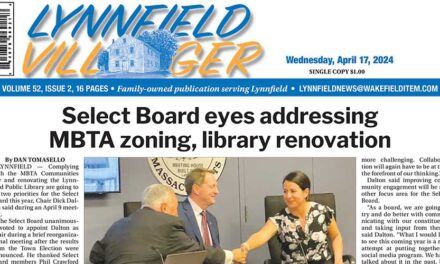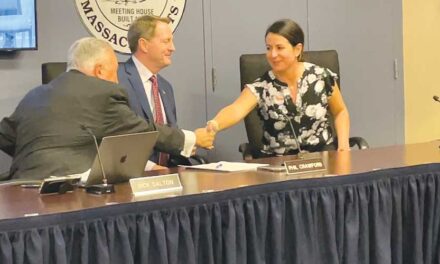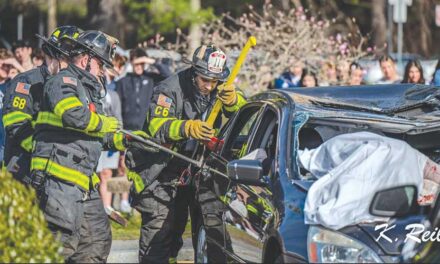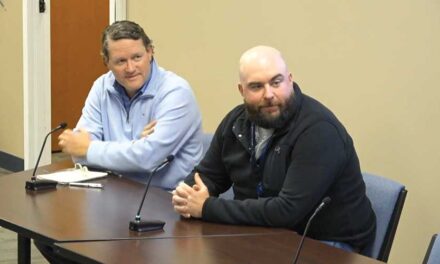By MAUREEN DOHERTY
LYNNFIELD — The selectmen raised a few questions about the first budget presentation of Superintendent of Schools Jane Tremblay for FY’16 at their Feb. 23 meeting but overall expressed their support for the initiatives being taken.
The preliminary operating budget for the next fiscal year totals $21,880,786 — a 4.5 percent increase over the final FY’15 appropriation of $20,938,552. Capital expenditure requests total an additional $550,000.
Selectmen Chairman Dave Nelson said as both a town official and a parent with two kids in the system he believes Tremblay’s budget is “right on track with what’s needed.”
“This is one of those times where the community really needs to invest in the schools,” Nelson said, adding, “You have to progress and you have to invest or you regress.”
The operating budget maintains the town’s status of spending less per pupil than the state average while adding four new positions totaling $116,202. It covers all of the district’s contractual obligations and meets the district’s educational goals, Tremblay said.
In FY’13, the most recent data available from the state, Lynnfield spent $12,615 per pupil, or about 11.2 percent less per pupil than the state average of $14,000.
The operating budget includes special education costs. Tremblay noted out-of-district SPED tuition has decreased from nearly $1.2M in 2012 to just under $600,000 in FY’16 due to successful in-town programs created by SPED specialist Kara Mauro. “It is not enough to just have programs, they need to be the right programs,” Tremblay said.
Capital budget: $550K
Capital expenditure requests totaling $550,000 are split between technology ($250,000), school security ($225,000) and conversion of preschool classrooms at 525 Salem St. into office space for the central administration ($75,000).
The technology capital budget includes $87,000 for 250 Chromebooks for incoming freshmen and half of the senior class. Tremblay said as the warranties on the iPads expire they will be phased out in favor of the Chromebooks, which cost roughly half as much.
The district has embraced the Google Suite platform for consistency in the teaching model at LMS and LHS and Tremblay said they have “one of only eight Google-certified trainers” in the state on staff. “We have over 2,000 students and 200 staff and (Jennifer Judkins) is that good that people are clamoring for her time,” Tremblay said.
Nelson asked whether “bring your own device” is still an option for students. Tremblay said it is “up for discussion” for many reasons. “Being able to maintain control over the devices and being able to access the Google Suite in an effective and efficient manner” are two reasons against BYOD, she said.
Selectman Tom Terranova asked Tremblay what would become of the older iPads after they are out of warranty. “We will put them on carts and support our classrooms. They may be used at lower (grade) levels but once they’re gone they’re gone,” Tremblay said.
Selectman Phil Crawford recalled that former Supt. Thomas Jefferson said fees collected from the foreign exchange students coming into the district would be used to offset the cost of the Chromebooks. Finance Director Tom Geary said they subsequently learned it would not be possible to use those fees in that manner. “Because they are foreign students the use of the funds had to be tied to the students,” Geary said.
With technology integration in learning a top priority district-wide, the $116,500 requested in new positions within the $21.8M operating budget includes $65,000 for a second technology integration specialist to meet demand, Tremblay said. The technology capital budget also includes $50,000 for wireless upgrades at both elementary schools; $48,000 for switches and servers; $40,000 for 10 whiteboards; $16,500 for 11 administrative laptops and $8,000 for eight desktops.
Security upgrades: $225K
Security upgrades in FY’16 total $225,000, including $145,500 for 118 cameras. Currently fewer than half that number are in use in the district. Infrared lighting will be added at the LHS fields so nighttime activity there would be visible to protect that investment, Tremblay said, which the selectmen also favored.
“We have pockets all over our school district that do not have security cameras. To have a good lens on what is going on in every corner of our schools we would need to add 118 security cameras district-wide. Some of these are replacing older cameras and some are brand new cameras to new spots,” Tremblay told the board.
It also includes $5,000 to install a buzzer system at LHS. The balance would be spent on network video recorders, main office video displays and switches.
The schools could give police access to the camera system in a crisis. Tremblay and Police Chief Dave Breen talk every Monday morning to discuss “what happened over the weekend,” she said. Getting a School Resource Officer in the schools is a priority because as “wonderful” as the town’s schools are “we do have behavior issues in our schools” which take time away from the lead administrators to resolve that would be “better suited to a police officer,” she told selectmen.
Terranova said the school’s security plan is “paramount” to keep children safe. “A lot of parents that I’ve talked to, they’re very concerned about that,” he said. Katy Shea, a candidate for selectman, asked Tremblay “who monitors the cameras?”
Tremblay said in addition to herself, access is granted to “the entire administrative leadership team and the police but not the teachers.”
Pre-K relocation benefits many
There are five immediate benefits to the $75,000 investment in renovations, Tremblay told the selectmen, the most important being it returns the preschool to the Summer Street School, where students and staff can interact with peers in space designed for preschoolers.
It also frees up space in cramped quarters at Town Hall for other general government uses. It provides the Senior Center at 525 Salem St. with additional program space. It provides a meeting room large enough to hold district-wide meetings for school staff. And it enables the Food Service Director to join other central office administrators in the new space, freeing up office space in LMS.
Terranova requested an explanation of the three types of fees collected by the schools totaling $538,500.
Finance Director Tom Geary said the district has “three sources of revenue that offset our budget.” Fees collected from LMS and LHS activities ($180,000), Community Schools ($80,000) and full-day kindergarten ($278,500) are applied against the operating budget, reducing it by an equal amount.




